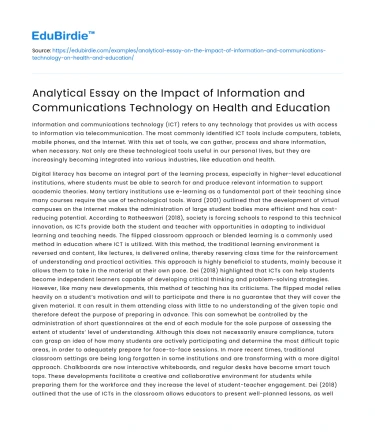Information and communications technology (ICT) refers to any technology that provides us with access to information via telecommunication. The most commonly identified ICT tools include computers, tablets, mobile phones, and the Internet. With this set of tools, we can gather, process and share information, when necessary. Not only are these technological tools useful in our personal lives, but they are increasingly becoming integrated into various industries, like education and health.
Digital literacy has become an integral part of the learning process, especially in higher-level educational institutions, where students must be able to search for and produce relevant information to support academic theories. Many tertiary institutions use e-learning as a fundamental part of their teaching since many courses require the use of technological tools. Ward (2001) outlined that the development of virtual campuses on the Internet makes the administration of large student bodies more efficient and has cost-reducing potential. According to Ratheeswari (2018), society is forcing schools to respond to this technical innovation, as ICTs provide both the student and teacher with opportunities in adapting to individual learning and teaching needs. The flipped classroom approach or blended learning is a commonly used method in education where ICT is utilized. With this method, the traditional learning environment is reversed and content, like lectures, is delivered online, thereby reserving class time for the reinforcement of understanding and practical activities. This approach is highly beneficial to students, mainly because it allows them to take in the material at their own pace. Dei (2018) highlighted that ICTs can help students become independent learners capable of developing critical thinking and problem-solving strategies. However, like many new developments, this method of teaching has its criticisms. The flipped model relies heavily on a student’s motivation and will to participate and there is no guarantee that they will cover the given material. It can result in them attending class with little to no understanding of the given topic and therefore defeat the purpose of preparing in advance. This can somewhat be controlled by the administration of short questionnaires at the end of each module for the sole purpose of assessing the extent of students’ level of understanding. Although this does not necessarily ensure compliance, tutors can grasp an idea of how many students are actively participating and determine the most difficult topic areas, in order to adequately prepare for face-to-face sessions. In more recent times, traditional classroom settings are being long forgotten in some institutions and are transforming with a more digital approach. Chalkboards are now interactive whiteboards, and regular desks have become smart touch tops. These developments facilitate a creative and collaborative environment for students while preparing them for the workforce and they increase the level of student-teacher engagement. Dei (2018) outlined that the use of ICTs in the classroom allows educators to present well-planned lessons, as well as provide students with an exciting learning experience.
Save your time!
We can take care of your essay
- Proper editing and formatting
- Free revision, title page, and bibliography
- Flexible prices and money-back guarantee
Much like e-learning, the concept of e-health was introduced to improve healthcare across the globe. According to the World Health Organization, it is the secure but cost-effective use of information and communication technologies to support any health-related areas, such as healthcare services, education, or knowledge and research. In close relation is m-health, an abbreviated term for mobile health, which is where persons use mobile phones and other forms of wireless technology in medical care. Crean (2010) indicated that innovations in e-health and m-health can facilitate new diagnostics and treatment for millions of people all over the world. Many hospitals have recognized the benefits of incorporating ICTs like computers into their medical practices, as they help to gain access to a wider variety of clinical knowledge, which results in quicker outcomes and quality healthcare for their patients. ICTs currently used by medical practitioners are mobile phone apps that allow patients to see and understand their lab work and have interactions without having to do walk-in appointments. Although this can be time-conserving and overall convenient, it may not be the easiest thing for older patients to use. However, with simple instructions and easy access, persons of any age can benefit from this technology. Other forms of smart devices are also gaining attention in the medical field. For example, the Philips Healthcare IntelliVue Guardian Solution is a wearable device that tracks a patient’s vital signs. It has built-in artificial intelligence software that predicts health issues in advance, thereby giving doctors a head start in treatment. With the implementation of this technology, doctors can efficiently save the lives of many patients.
We all recognize that ICTs enhance our lives in more ways than one, but within fields like health and education, they serve greater purposes: improving healthcare and developing the minds of school students by exposing them to work-like environments in preparation for the future. As technology continues to develop, so will the effect that it has on the people who use it.






 Stuck on your essay?
Stuck on your essay?

